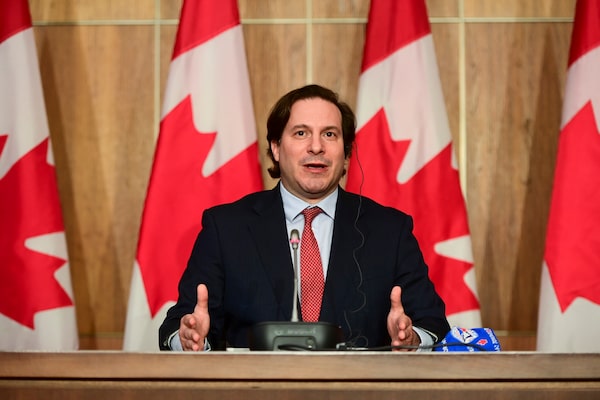
Marco Mendicino, Minister of Immigration, Refugees and Citizenship, announces measures of support to in-Canada families of victims of Ethiopian Airlines Flight 302 and Ukraine International Airlines Flight 752 during a press conference in Ottawa on May 13, 2021.Sean Kilpatrick/The Canadian Press
The federal government will ease the way for families of victims of two major air disasters – including last year’s downing of a passenger plane by Iranian forces – to become permanent residents in Canada.
In an unprecedented step, the government will cut through the usual immigration process to allow relatives of victims of the crashes of Ukraine International Airlines Flight 752 and Ethiopian Airlines Flight 302 to apply for permanent status.
Immigration Minister Marco Mendicino described it as a compassionate gesture to the families as they continue to seek answers and justice. It gives relatives of victims with certain ties to Canada – citizens, permanent residents, or those whose applications for permanent residence had already been approved – a year to apply to settle here.
“What the public policy that we launched yesterday does, is it looks at this through the lens of achieving justice and accountability for the families by demonstrating compassion,” Mr. Mendicino said.
Immigration Minister promises to address concerns over new federal immigration program
Immigration Minister open to raise permanent residency caps
The move is one of several special steps the government has taken recently to temporarily ease immigration rules after the COVID-19 pandemic caused a dramatic reduction in immigration to Canada. But in this case, it is also a gesture to the families of the many Canadian victims of the high-profile air disasters, tragedies that sparked an outpouring of sympathy from the public.
The crash of Ethiopian Airlines Flight 302 crash in March, 2019, near the town of Bishoftu, Ethiopia, led to the deaths of all 157 passengers on board, including 18 Canadians. The cause is still being investigated.
Ukraine International Airlines Flight 752 was shot down in January, 2020, by two Iranian missiles minutes after taking off from Tehran. Fifty-five of the 176 people on board were Canadian citizens, 30 were permanent residents and 53 others were bound for Canada.
Iranian officials blamed the crash on human error – a mistake by air-defence forces in the midst of a tense dispute with the United States that had threatened to explode into war.
But the report issued last December by Ralph Goodale, Prime Minister Justin Trudeau’s special adviser on the disaster, laid out a startling set of missteps that would have to be involved in mistaking the 40-metre outbound commercial airliner for an enemy attack. Mr. Goodale concluded Iran bears responsibility for failing to conduct independent, transparent investigations.
“Vital questions about the exact chain of events and decision-making remain unanswered, as do inquiries about how that dangerous airspace could possibly have been left open to civilian traffic,” Mr. Goodale wrote.
At a parliamentary committee hearing Thursday afternoon, Foreign Affairs Minister Marc Garneau declined to say whether he believe the crash was the result of a deliberate Iranian attack, suggesting Iran has not yet provided enough information. “We require Iran to be fully accountable for what happened,” he said.
Families that wish to apply for permanent resident status under the new policy must be relatives of crash victims who were Canadian citizens, permanent residents or applicants for permanent-status who had received approval. They can be not only spouses, parents, siblings and children, but also aunts, uncles, nieces and nephews. But they have to be in Canada to apply.
The Minister said Immigration, Refugees and Citizenship Canada is working on facilitating permanent residence for families who are not in the country.
Family members who were issued temporary residence visas after the disasters will be able to have their visas extended, the government’s statement said.
Syed Hussan, executive director of the Migrant Workers Alliance for Change, said that while he is glad the federal government is supporting the non-status families of the victims, many migrant workers are still not able to gain status.
“Permanent residency is not a gift; it is a mechanism through which rights are accessed,” Mr. Hussan said.
Bessma Momani, a political science professor at the University of Waterloo, said giving the families status is a small compassionate gesture but only Iran can provide closure.
“I think they want the Iranian government to certainly admit its culpability. I’m afraid I don’t think we’re going to get that,” Prof. Momani said.
Know what is happening in the halls of power with the day’s top political headlines and commentary as selected by Globe editors (subscribers only). Sign up today.